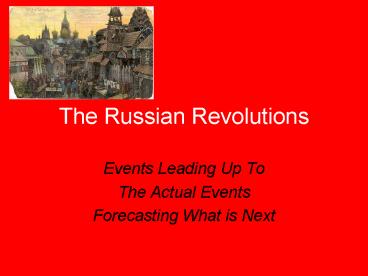The Russian Revolutions - PowerPoint PPT Presentation
1 / 17
Title:
The Russian Revolutions
Description:
Events between 1904-1917 ... March 1917, women textile workers in Petrograd lead a citywide strike ... This local protest exploded into a general uprising ... – PowerPoint PPT presentation
Number of Views:30
Avg rating:3.0/5.0
Title: The Russian Revolutions
1
The Russian Revolutions
- Events Leading Up To
- The Actual Events
- Forecasting What is Next
2
The Problems of the Czar
- Events between 1904-1917 demonstrated the Czars
weakness - The Russian defeat in the Russo-Japanese War
- Bloody Sunday
- Creation of the Duma
- World War I
3
The March Revolution
- March 1917, women textile workers in Petrograd
lead a citywide strike - Nearly 200,000 workers protested
- At first soldiers followed orders to shoot at
protestors - Later they joined the rebellion
- This local protest exploded into a general
uprising - Question 1 What do you think was Nicholas II
response to this revolt?
4
The March Revolution Continued
- Czar Nicholas II was forced to abdicate his
throne - Question 2 What does abdicate mean?
5
The March Revolution- Continued
- Czar Nicholas II was forced to abdicate his
throne - He stepped down from his position as leader
- A year later he and his family were murdered
- The reign of the Romanov family finally ended
after over 300 years
6
The Provisional Government
- Leaders of the Duma established a provisional, or
temporary government - Alexander Kerensky became the leader
- He decided to keep Russia in WWI
- Question 3 What effect do you think this had on
his leadership?
7
The Provisional Government- continued
- Leaders of the Duma established a provisional, or
temporary government - Alexander Kerensky became the leader
- He decided to keep Russia in WWI
- This cost him the support of soldiers and
civilians - Angry peasants demanded land
- City workers grew more radical
- Social revolutionaries formed Soviets
8
The Provisional Government- continued
- Soviets were local councils consisting of
workers, peasants, and soldiers - In many cities the Soviets had more power and
influence than the provisional government
9
The Provisional Government- continued
- Question 4 At this time Germany launches a
secret weapon on the Russians- what do you
think it might be?
10
The Provisional Government- continued
- The Germans arrange for Lenins return to Russia
- They believe that Lenin and his Bolshevik
supporters would stir unrest in Russia and hurt
the war effort - Lenin arrived in a sealed boxcar in April 1917
11
The Bolshevik Revolution
- Lenin and the Bolsheviks acted immediately upon
his return - Seized control of the Petrograd Soviet
- Soon took control of soviets in other major
cities - By the fall of 1917 people all over Russia were
responding to Lenins cry of Peace, Land and
Bread
12
The Bolshevik Revolution- continued
- The Provisional Government topples
- Bolshevik Red Guards (armed factory workers) took
over government offices in Petrograd - They arrested the leaders of the Provisional
Government
13
The Bolshevik Revolution- continued
- Bolsheviks in Power
- Question 5 What do you think Lenins first
acts as leader were?
14
The Bolshevik Revolution- continued
- Bolsheviks in Power
- All farmland be redistributed among the peasants
- Factory control be given to the workers
- Signed a truce with Germany to end Russian
involvement in WWI - Question 6 What feelings did the Russian
people have after this decision?
15
The Bolshevik Revolution- continued
- Bolsheviks in Power
- All farmland be redistributed among the peasants
- Factory control be given to the workers
- Signed a truce with Germany to end Russian
involvement in WWI - In the treaty they had to give up a large section
of land to the Germans - Wide-spread anger against the Bolsheviks
developed
16
The Bolshevik Revolution- continued
- Civil War Rages
- Bolshevik opponents formed the White Army
- Leon Trotsky lead the Bolsheviks Red Army
- Question 7 Many Western nations sent aid- what
side do you think they wanted to help? Why?
17
The Bolshevik Revolution- continued
- Civil War Rages
- Bolshevik opponents formed the White Army
- Leon Trotsky lead the Bolsheviks Red Army
- Western nations aided the White Army
- In the end the Red Army triumphed and crushed a
opposition to the Bolsheviks - Results were devastating
- 15 million Russians died
- Fighting, hunger, flu epidemic
- Lenin and the Bolsheviks faced overwhelming
problems































